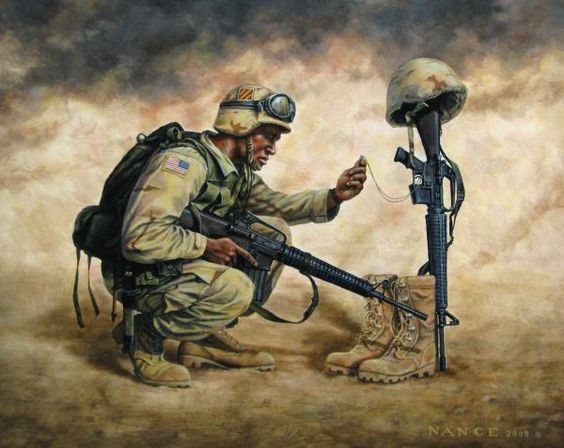Diatribes of a Knucklehead 160115
During 2006 I was assigned as the Marine 1st Sgt for the Inspector Instructor (I-I) Staff on Hunter Army Airfield, Savannah Georgia. I was also attending Saint Leo University at night. I had just finished my first version of my book, “Surviving Combat Handbook.” My accounting professor somehow knew about my book; but he never let on.
One Sunday afternoon my professor called me on my government cell phone. He told me about a young 3rd Infantry Division soldier from his church that was having major issues with combat stress. He had been through every level of medical care available on Fort Stewart’s to include psychologist and psychiatrists. His family was concerned he was on the brink of suicide. My professor asked if I could speak to the young soldier the same afternoon. I told my wife about the situation and as usual she understood me not being around; this time for a very good reason.
I went to the RTC (Reserve Training Center) got into uniform and waited for the soldier to show up. I met the specialist outside and he did not look happy to see me. He was a specialist (E-4) and I was a not just a 1stSgt, but a Marine 1st Sgt. He did not want to talk. After a while I got him to tell me that he had been to Iraq and we started talking about common places and once he realized I was also an infantryman, who had served in the same areas (at different times) he started to talk a little.
To be totally honest, about three hours into getting nowhere I started getting a little frustrated. I looked at this young warrior slouched in the chair not making eye contact:
Me: Hey soldier, what is it? I knew there might be many reasons for your anxiety, but I will bet there is one story that stands out. What is it?
Spc: 1stSgt, we did a lot of stuff over there. But, the worst was the day we killed a bunch of women and children. I should say we murdered them.
Me: (in shock at what I just heard) Excuse me? Explain?
Spc: We were working a VCP (Vehicle Check Point) when civilian bus came barreling down the road and ignored our signs ordering traffic to slowdown and our stop signs. (The soldier stopped talking and was breathing rapidly). Then he said; So, what did we do? We lit it up with machineguns and other small arms fire. The bus came to a halt and we closed on it slowly; still worried it was a VBIED. When we got there we found a male driver and bus full of what appeared to be non-combatants. They were all dead or dying.
Me: So. Where is the Murder part?
Spc: I juts told you 1stSgt; we killed a bus filled with noncombatants, that is murder!
Me: NO, murder required premeditation. Did you know the bus was filled with noncombatants?
Spc: No sir.
Me: Did you tell the driver to NOT slow down or stop for the signs in his language that clearly told him to do so? Remember, every other car you had encountered at the checkpoint figured it out; therefore he is partially responsible.
Spc: But, they were noncombatants…..
Me: Stop – specialist. Listen to me. If you and your friends did not know the bus was filled with non-combatants you could not have committed murder here. There was no premeditation. What if it had been a VBIED and you did not do your job? Maybe you would be upset your friend died because you did not do your job. War is terrible and unfortunately innocent people die; there is no way around it.
Spc: (For the first time in four hours, he sat up straight, almost smiled). You know 1stSgt, you are the first person to explain to me that I am not a murderer. I wanted to die, because I just could not handle the fact that I was a murderer. Not one of my leaders, or doctors, psychologists or even my psychiatrist has helped me through this.
Me: Did you tell them this story?
Spc: No sir; they never asked.
Over the years I learned from Navy Corpsman, Navy IDCs (Independent Duty Corpsman), Recon Docs, and Army 18Ds that you must always look for the exit wound and any other injuries. The wound that looks the worst might distract you from the biggest threat. Over the last year this young warrior had been receiving superficial mental health treatment from some of the best mental health people in the world; yet it took a simpleton like me little effort to figure it.
In the end, the soldier looked my straight in the eyes, shook my hand with both of his hands and said thank you sir. He then gave me a big man hug and ditty bopped out to the waiting car.
My professor called me a few hours later and said: “What did you do to this kid? He is almost normal again, for the first time since he returned from Iraq. He is eating, laughing, joking and is a pleasure to be around again. Thank you, thank you, thank you….”
I said: you are welcome. Does this mean I get an A? He laughed and said, if you earn it. Thank you again. FYI, I did earn the A.
In sum, we all need to start looking for the psychological exit wounds in our friends and ourselves. Death from a thousand cuts is still death, but it is a long slow death. We need to patch our wounds as we detect them.
Remember, loneliness kills, look out for your friends just like you did in combat.
SF DKD


